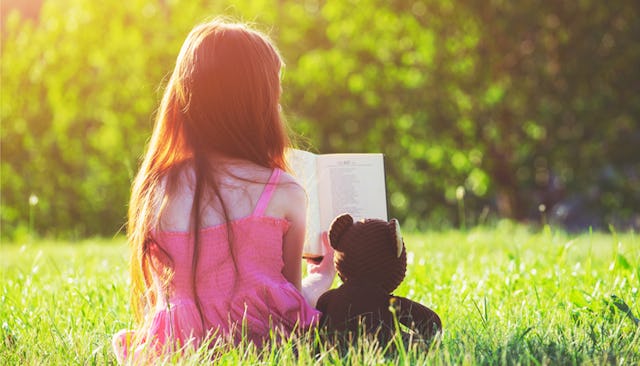The Incomparable Magic Of Watching Your Child Learn To Read

We’re snuggled in my 7-year-old’s bed, his head resting on my arm wrapped around his shoulders. He holds one side of a Winnie the Pooh book and I hold the other. He reads the last sentence out loud, then looks up at me, beaming.
“Mommy!” he squeals. “I read the whole thing!”
“Yes, you did!” I reply. “Look at you!”
It’s a moment I’ve experienced with each of my three kids, and it’s incomparably magical every time.
There are many noteworthy milestones in a child’s life, but there is nothing like watching your child read a whole book all by themselves for the first time. The learning to read process is wondrous and mysterious and unique to each child. When the various moving parts all come together and it finally “clicks,” it’s like seeing an entire world open up for them. As a parent, it’s an unbelievably fun and rewarding thing to witness.
Our oldest daughter read extraordinarily early. I remember telling a kindergarten teacher that she was reading fluently at 4. “Some kids memorize books and seem to be reading,” was her response. Um, no. The kid could read practically anything you put in front of her. She had a freakish interest in letters and words from the time she was a baby, and formed a connection to the written word much earlier than our other two. We used to joke that she came out of the womb with a book in her hand. (“Book” was, in fact, her first word.)
Our second kid read quite a bit later. In fact, I started to wonder at age 7 if she was ever going to read. She did okay with the mechanics for the most part, but she didn’t enjoy it. She never read for pleasure and pushed back on every attempt to get her to read for school. She was our feral child, much more interested in galavanting around in nature than sitting down with a book. But one day, her older sister started reading a series about cats, and she got hooked. She went from complaining about reading to spending hours a day devouring novel after novel.
Now our third kid — my baby boy who just turned 8 — is just entering that fluent reading stage. In the past year, he’s gone from sounding out most words to only having to decipher the big ones. And it’s been every bit as exciting and amazing as it was with the other two.
Reading is a significant tool for learning — perhaps the most important one as a child gets older. When you can read, you can go to any library and learn about literally anything for free. Reading stories can make us more empathetic and tolerant as well. Both fiction and non-fiction reading affects the way we think, the way we look at the world, the way we understand others and ourselves. I can’t imagine a life without being able to read.
Of course, there are some downsides to a child becoming a fluent reader, especially if they read early. It’s a special parenting moment when your 6-year-old scans the magazine covers in the check-out line and says, “Mommy? What’s an ‘orgasm’?” (Thanks, Cosmo.) You have to start shooing them away from your phone when you’re texting your husband about something you don’t want them to know about, or tell them to stop looking over your shoulder when you’re reading an article about Syrian children and their parents’ dismembered bodies. That whole new world is not always age-appropriate, so it adds a new complexity to parenting.
But that’s nothing compared to being able to discuss things they’ve read, or watching your child get so engrossed in a book that they don’t want to put it down. One of my favorite things to see is a kid tucked into bed with a book and a flashlight, even if it means they’re staying up later than they should. It’s a beautiful thing.
There aren’t many parts of parenting small children that I’d want to relive, but this is one. As much as I’m thrilled that my last child is reading, I’m a little sad that this is the last time I’ll get to see this process unfold in detail before my eyes. Watching a child enter the world of literacy is like watching a seed open up and become a flower — you know that it’s going to happen, but it still seems miraculous and magical every time it does. I have been awed by it with each of my children, and it will forever remain one the greatest joys of my parenting journey.
This article was originally published on